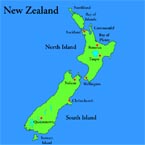Foreign minister contradicts witness in donation probe
 Wellington - New Zealand's foreign minister, battling for his political life over claims of secret donations to his party, defended himself at a hearing of Parliament's powerful privileges committee Wednesday night.
Wellington - New Zealand's foreign minister, battling for his political life over claims of secret donations to his party, defended himself at a hearing of Parliament's powerful privileges committee Wednesday night.
Winston Peters rejected testimony to the committee by expatriate billionaire businessman Owen Glenn on Tuesday that the minister had personally asked for money, and later thanked him for a cheque for 100,000 New Zealand dollars (about 67,000 US dollars) that he donated in 2005.
Glenn flew from his home in Monaco armed with a file of telephone records, emails and an affidavit from a witness to testify to the committee which is investigating a complaint that the leader of the New Zealand First party failed to declare the donation as obliged by law.
But Peters said that he never discussed money with Glenn during a telephone conversation with the businessman on December 14 2005. Glenn told the committee he had confirmed the donation during that call and received an email from Peters' attorney six minutes later giving details of the bank account it was to be sent to.
Peters, 63, gave evidence to the committee knowing that his political future rested on convincing Prime Minister Helen Clark that his version of events was right.
He stood down from his ministerial duties last week pending the inquiry. Clark, who described Glenn's evidence as "quite disturbing," was widely reported as being ready to sack Peters if he could not convincingly rebut it.
Peters told the committee he was victim of a conspiracy.
"This is an attempt to undo the people's will, bring down a government, then govern alone," he said, adding that he wanted to be judged "by decent New Zealanders who understand justice."
Glenn, who said he had flown to New Zealand at his own expense to clear his name, told journalists before leaving the country on Wednesday, "I don't think people with forgetful memories should be minister of foreign affairs.
"I think people in elected positions and privileged positions need to act ethically and be trusted, and I doubt he can be."
Peters said that during the December 2005 telephone call, Glenn suggested that he should become a roving ambassador for New Zealand, given a diplomatic passport and be named consul general to Monaco.
He maintained that he knew nothing about Glenn's donation until his lawyer told him about it in July, saying it had gone into a blind trust fund.
Peters' New Zealand First party supports Clark's Labour-led administration while staying outside the formal coalition.
He is a veteran populist politician who has built his career on claims that he was independent of big business and, unlike the main political parties, did not accept large donations from wealthy benefactors.
He is also subject to separate investigations about donations to his party by the Senior Fraud Office and the police. (dpa)